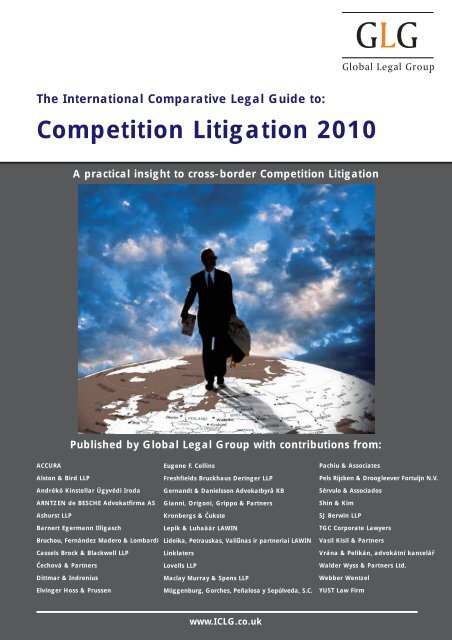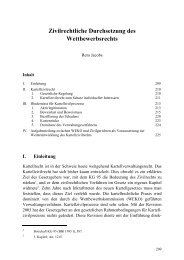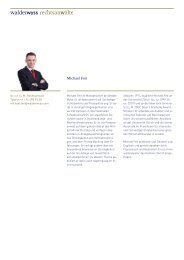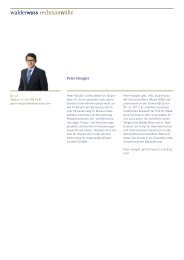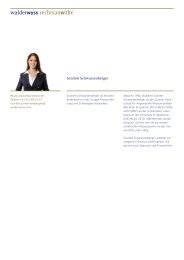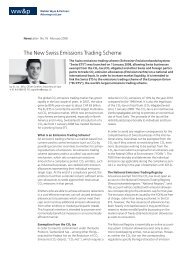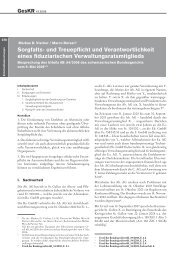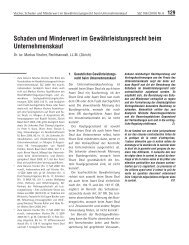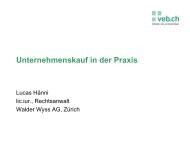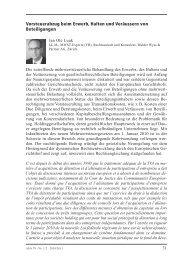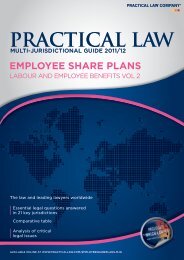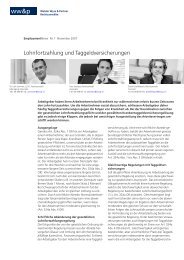Competition Litigation 2010 - Walder Wyss Ltd.
Competition Litigation 2010 - Walder Wyss Ltd.
Competition Litigation 2010 - Walder Wyss Ltd.
You also want an ePaper? Increase the reach of your titles
YUMPU automatically turns print PDFs into web optimized ePapers that Google loves.
The International Comparative Legal Guide to:<br />
<strong>Competition</strong> <strong>Litigation</strong> <strong>2010</strong><br />
A practical insight to cross-border <strong>Competition</strong> <strong>Litigation</strong><br />
Published by Global Legal Group with contributions from:<br />
ACCURA<br />
Alston & Bird LLP<br />
Andrékó Kinstellar Ügyvédi Iroda<br />
ARNTZEN de BESCHE Advokatfirma AS<br />
Ashurst LLP<br />
Barnert Egermann Illigasch<br />
Bruchou, Fernández Madero & Lombardi<br />
Cassels Brock & Blackwell LLP<br />
v<br />
Cechová & Partners<br />
Dittmar & Indrenius<br />
Elvinger Hoss & Prussen<br />
Eugene F. Collins<br />
Freshfields Bruckhaus Deringer LLP<br />
Gernandt & Danielsson Advokatbyrå KB<br />
Gianni, Origoni, Grippo & Partners<br />
Kronbergs & Cukste<br />
v<br />
Lepik & Luhaäär LAWIN<br />
Lideika, Petrauskas, Valiunas ir partneriai LAWIN<br />
Linklaters<br />
Lovells LLP<br />
Maclay Murray & Spens LLP<br />
Müggenburg, Gorches, Peñalosa y Sepúlveda, S.C.<br />
Pachiu & Associates<br />
Pels Rijcken & Droogleever Fortuijn N.V.<br />
Sérvulo & Associados<br />
Shin & Kim<br />
SJ Berwin LLP<br />
TGC Corporate Lawyers<br />
Vasil Kisil & Partners<br />
v<br />
Vrána & Pelikán, advokátní kancelár<br />
<strong>Walder</strong> <strong>Wyss</strong> & Partners <strong>Ltd</strong>.<br />
Webber Wentzel<br />
YUST Law Firm<br />
www.ICLG.co.uk
Chapter 33<br />
Switzerland<br />
Reto Jacobs<br />
<strong>Walder</strong> <strong>Wyss</strong> & Partners <strong>Ltd</strong>.<br />
Gion Giger<br />
1 General<br />
out above, the majority of the procedural rules are still laid down in<br />
Cantonal law.<br />
178<br />
1.1 Please identify the scope of claims that may be brought in<br />
Switzerland for breach of competition law.<br />
Under the Swiss Federal Act on Cartels and Other Restraints of<br />
<strong>Competition</strong> (LCart), civil competition actions can be brought<br />
before Swiss civil courts by enterprises which are impeded by an<br />
unlawful restraint of competition. Such unlawful restraint of<br />
competition may consist either:<br />
in unlawful horizontal or vertical agreements that<br />
significantly affect competition without being justified by<br />
economic efficiency or that lead to the suppression of<br />
effective competition (article 5 LCart); or<br />
in an abuse of a dominant position (article 7 LCart).<br />
The action is aimed at the enterprise restraining competition. In<br />
case of unlawful agreements, the adverse party is one or several<br />
enterprises involved in such unlawful agreements; in case of abuse<br />
of a dominant position, the adverse party is the enterprise having a<br />
dominant position in the market. It is not mandatory to sue several<br />
parties liable for the restraint together as these have joint and<br />
several liability.<br />
1.2 What is the legal basis for bringing an action for breach of<br />
competition law?<br />
Civil competition actions for breach of the LCart are based on<br />
article 5 LCart (unlawful agreements) or on article 7 LCart (abuse<br />
of a dominant position).<br />
Articles 12 to 17 LCart provide some special procedural rules for<br />
civil proceedings. For the majority of the procedural rules the 26<br />
Cantonal codes of civil procedure apply. However, a federal code<br />
of civil procedure will replace these 26 Cantonal codes. Articles 14<br />
(jurisdiction), 16 (protection of business secrets) and 17 LCart<br />
(interim remedies) will also be substituted for similar provisions. It<br />
is expected to come into force on 1 January 2011. For a pending<br />
civil action, the relevant Cantonal code will remain applicable for<br />
the procedures at the instance the action will already have reached,<br />
but not for procedures before any further instances. The following<br />
explanations focus on the present law, as it will still be applicable<br />
in <strong>2010</strong> (with some remarks whether the law will change in 2011).<br />
1.3 Is the legal basis for competition law claims derived from<br />
international, national or regional law?<br />
The main legal basis is Swiss federal law. However, as already set<br />
1.4 Are there specialist courts in Switzerland to which<br />
competition law cases are assigned?<br />
Civil competition actions are assigned to the normal civil courts and<br />
commercial courts respectively (if any). As every Swiss Canton is<br />
competent to establish its courts, the court before which civil<br />
competition actions have to be brought is assigned by Cantonal law.<br />
However, federal law requires that there is only one single court in<br />
each Canton which handles competition cases. Usually, the<br />
Cantonal rules assign civil competition actions to a higher Cantonal<br />
court.<br />
Some Cantons (Zurich, Berne, Aargau, St. Gallen) have established<br />
special courts for commercial matters whose judges have special<br />
knowledge with respect to commercial matters. These commercial<br />
courts are also the competent courts for civil competition actions.<br />
However, they are not specialised in competition law cases only, but<br />
more generally in commercial matters, including e.g. intellectual<br />
property.<br />
The new federal code of civil procedure will not change these rules<br />
of jurisdiction. It will be for the Cantons to decide whether to<br />
assign competition law cases to courts for commercial matters. But<br />
still, there will not be any courts exclusively dealing with<br />
competition law cases.<br />
1.5 Who has standing to bring an action for breach of<br />
competition law and what are the available mechanisms<br />
for multiple claimants? For instance, is there a possibility<br />
of collective claims, class actions, actions by<br />
representative bodies or any other form of public interest<br />
litigation?<br />
In order to have standing for a claim, it suffices for the claimant to<br />
be affected by the restraint of competition. It is neither necessary<br />
for the claimant to be a competitor nor does the restraint have to be<br />
directly aimed at the claimant. However, according to the<br />
prevailing doctrine, consumers are not authorised to bring claims<br />
based on the LCart.<br />
Collective actions or actions brought by associations do not exist in<br />
Swiss competition law. Class actions are completely unknown in<br />
Swiss law. In connection with the preliminary work for the new<br />
federal code of civil procedure, the introduction of class actions was<br />
discussed but rejected.<br />
However, it is possible that several claimants form a simple dispute<br />
association (einfache Streitgenossenschaft). Furthermore, there is<br />
WWW.ICLG.CO.UK<br />
ICLG TO: COMPETITION LITIGATION <strong>2010</strong><br />
© Published and reproduced with kind permission by Global Legal Group <strong>Ltd</strong>, London
<strong>Walder</strong> <strong>Wyss</strong> & Partners <strong>Ltd</strong>.<br />
Switzerland<br />
nothing to be said against several parties assigning their claims for<br />
damages or profit remittance to a third party. Such third party will<br />
then bring the entire claim as claimant in its own name.<br />
1.6 What jurisdictional factors will determine whether a court<br />
is entitled to take on a competition law claim?<br />
In international cases, jurisdiction for civil competition actions in<br />
Switzerland is given if the defendant has its seat or domicile or - for<br />
lack of domicile - its ordinary residence or its settlement in<br />
Switzerland. Even if the defendant does not have a seat, a residence<br />
or a settlement in Switzerland, jurisdiction is given if the place<br />
where the act was committed or had its effects lies in Switzerland<br />
(article 129 of the Swiss Federal Act on International Private Law).<br />
If the Lugano Convention applies, the defendant can be sued at its<br />
seat or its domicile respectively or at the place where the act had its<br />
effects (article 2 and article 5 para. 3 Lugano Convention).<br />
Nationality or residence of the claimant is of no significance.<br />
Similar rules apply in domestic cases without any international<br />
dimension. The court at the domicile or seat of the damaged<br />
enterprise or of the defendant or the court at the place where the act<br />
was committed or had its effects have jurisdiction (article 25 of the<br />
Federal Act on Civil Jurisdiction).<br />
1.7 Is the judicial process adversarial or inquisitorial?<br />
The civil judicial process in Switzerland is adversarial.<br />
2 Interim Remedies<br />
2.1 Are interim remedies available in competition law cases?<br />
Interim remedies are available (article 17 LCart; articles 28c to 28f<br />
of the Swiss Civil Code [CC]).<br />
2.2 What interim remedies are available and under what<br />
conditions will a court grant them?<br />
Interim remedies focus on avoiding or terminating the restraint of<br />
competition. All appropriate and reversible measures for such<br />
interim execution are possible, e.g. the interim obligation to supply,<br />
to enter into a contract or to grant admission to a trade fair.<br />
The claimant has to show credibly by prima facie evidence that its<br />
main action is presumably justified and that the claimant is likely to<br />
incur a hardly reparable disadvantage during the course of the civil<br />
proceeding if no interim remedies are granted.<br />
In case of high urgency, interim remedies may be granted to the<br />
claimant without having heard the defendant in advance (ex parte<br />
remedies). In such cases, the defendant will be heard after the first<br />
decision only and the court will then reconsider the interim remedies.<br />
3 Final Remedies<br />
3.1 Please identify the final remedies which may be available<br />
and describe in each case the tests which a court will<br />
apply in deciding whether to grant such a remedy.<br />
LCart refers to articles 41 et seq. and article 423 of the Swiss Code of<br />
Obligations [CO]). Additionally, unlawful contracts are void in whole<br />
or in part. The impeded enterprise may bring before the courts an<br />
action for a declaratory judgement regarding such voidness.<br />
The court will assess for each claim whether all prerequisites have<br />
sufficiently been proven by the party that bears the burden of proof.<br />
The prerequisites for a claim for damages are: occurrence of loss;<br />
unlawful restraint of competition; causal link between such<br />
restraint; and the occurrence of loss and fault.<br />
In case of a claim for remittance of the illicitly earned profits, the<br />
claimant has to prove that the defendant made net profits for which<br />
the unlawful restraint of competition was causal and that the<br />
defendant acted in bad faith.<br />
3.2 If damages are an available remedy, on what bases can a<br />
court determine the amount of the award? Are exemplary<br />
damages available?<br />
The court will mainly determine the amount of the award based on<br />
the incurred loss that the claimant was able to prove. However,<br />
quantifying and even evidencing the damages may pose a severe<br />
problem in the context of a claim. It should be possible in most<br />
Cantons (and also under the new federal code of civil procedure) to<br />
initially submit an action for an unspecified amount and to specify<br />
the amount after the procedure of taking evidence has been<br />
concluded. Under certain circumstances, an action for an<br />
unspecified amount can be submitted to the defendant together with<br />
a request for information. If the exact amount of damages cannot<br />
be established, the judge shall assess them in his discretion (article<br />
42 para. 2 CO). This provision is also applicable if it is not possible<br />
to provide any strict proof that an actual damage even occurred.<br />
Exemplary or punitive damages do not exist in Switzerland. Under<br />
Swiss law, damages are only granted in order to compensate the<br />
claimant for incurred loss.<br />
3.3 Are fines imposed by competition authorities taken into<br />
account by the court when calculating the award?<br />
There is no legal provision allowing the court to take imposed fines<br />
into account when calculating the award. Fines imposed by the<br />
competition authorities are administrative sanctions. Their purpose<br />
is to prevent unlawful behaviour of market participants and, by their<br />
preventive effect, they primarily serve the protection of public<br />
interests in an effective competition instead of private interests in<br />
compensation. As the claimant does not receive any compensation<br />
from the fines imposed by the competition authorities, the court is<br />
not allowed to take such fines into account when calculating the<br />
amount of damages.<br />
4 Evidence<br />
4.1 What is the standard of proof?<br />
The court is free to weigh and evaluate the evidence provided by the<br />
parties. Basically, the parties need to provide evidence for all facts<br />
for which they bear the burden of proof and to fully convince the<br />
judge that such facts took place just as the party alleges.<br />
Switzerland<br />
Article 12 LCart rules that the impeded enterprise may sue for<br />
removal or cessation of the restraint of competition, for damages<br />
and reparations and for remittance of the illicitly earned profits.<br />
Regarding damages, reparations and profit remittance, article 12<br />
4.2 Who bears the evidential burden of proof?<br />
ICLG TO: COMPETITION LITIGATION <strong>2010</strong><br />
© Published and reproduced with kind permission by Global Legal Group <strong>Ltd</strong>, London<br />
The basic rule regarding the burden of proof is laid down in article<br />
8 CC. Each party bears the burden of proof regarding all alleged<br />
WWW.ICLG.CO.UK 179
<strong>Walder</strong> <strong>Wyss</strong> & Partners <strong>Ltd</strong>.<br />
Switzerland<br />
Switzerland<br />
facts that the party bases its claim on. The parties do not only have<br />
the burden of proof in the sense that they have to bear the<br />
consequences of the lack of proof but also have to bring the<br />
evidence into court. The parties shall collect and submit the<br />
evidence to the court. The court is neither authorised to collect<br />
evidence on its own nor to base its judgement on evidence not<br />
submitted by the parties.<br />
An enterprise that intends to bring a claim according to article 12<br />
LCart must prove that there are legal prerequisites for the sued<br />
claim (for example the occurrence of a loss in case of a claim for<br />
damages) as well as unlawful restraints of competition according to<br />
art. 5 or 7 LCart and that therefore the claimant is impeded in the<br />
exercise of competition.<br />
However, there are substantial mitigations of the burden of proof in<br />
the following cases: according to article 5 para. 3 and 4 Act on<br />
Cartels it is assumed for certain types of agreement that they<br />
eliminate competition. The claimant must only prove the basis of<br />
the legal presumption, i.e. the existence of the respective type of<br />
agreement (e.g. horizontal price agreements, resale price<br />
maintenance in distribution agreements). In this case, the claimant<br />
does not have to prove that effective competition has been<br />
eliminated. In order to refute the presumption, the defendant must<br />
evidence the opposite, namely that in spite of the agreement there is<br />
still sufficient internal and external competition.<br />
However, this possibility is of limited use only since it presupposes<br />
adequately substantiated allegations by the claimant. Furthermore,<br />
it must be pointed out that third parties can refuse the issuance of<br />
documents to the court, provided that they have the right to refuse<br />
to provide information.<br />
In general, an exchange of information between the <strong>Competition</strong><br />
Commission and the civil courts does not take place.<br />
4.5 Can witnesses be forced to appear? To what extent, if any,<br />
is cross-examination of witnesses possible?<br />
Witnesses are usually obligated to appear personally before the<br />
court, even if they have the right to refuse to give evidence based<br />
on Cantonal law. They have to refer to such right personally before<br />
the court. Witnesses who fail to appear without adequate<br />
justification may be sentenced to bear the costs and to pay a fine.<br />
Witnesses can even be summoned with the aid of the police.<br />
However, details of these rules may vary from Canton to Canton.<br />
Uniform rules for all Cantons will apply from 2011.<br />
Cross-examination is not possible in Switzerland. Usually the<br />
witnesses will be interrogated directly by the judge but not by the<br />
parties or the parties’ legal counsels. The parties may request the<br />
judge to ask specific questions to the witness. Again, slightly<br />
different rules may apply in some Cantons.<br />
4.3 Are there limitations on the forms of evidence which may<br />
be put forward by either side? Is expert evidence<br />
accepted by the courts?<br />
The admissible forms of evidence are limited by the Cantonal codes<br />
of civil procedure. However, the rules do not vary substantially<br />
between the Cantons. Generally, the following forms of evidence are<br />
admissible: documents, witnesses, inspection by the court, expert<br />
evidence, interrogation of the parties. These forms of evidence will<br />
also be available under the federal code of civil procedure.<br />
Expert evidence is generally accepted by the courts. However,<br />
experts need to be independent from the parties and are appointed<br />
by the courts. An expert opinion submitted by a party is usually not<br />
seen as more evidence than a simple allegation.<br />
4.6 Does an infringement decision by a national or<br />
international competition authority, or an authority from<br />
another country, have probative value as to liability and<br />
enable claimants to pursue follow-on claims for damages<br />
in the courts?<br />
According to existing doctrine, the <strong>Competition</strong> Commission’s<br />
decisions are not binding for civil courts. In practice however, civil<br />
judges will hardly deviate from the <strong>Competition</strong> Commission’s<br />
opinion so that such decision facilitates follow-on claims. As the<br />
judge is free under Swiss law as to how he assesses the evidence<br />
produced by the parties, it cannot be excluded that he will also<br />
consider an infringement decision of a foreign competition<br />
authority if the legal and factual situation is comparable.<br />
180<br />
4.4 What are the rules on disclosure? What, if any,<br />
documents can be obtained: (i) before proceedings have<br />
begun; (ii) during proceedings from the other party; and<br />
(iii) from third parties (including competition authorities)?<br />
Pre-trial discovery is not available in Switzerland. Thus, the<br />
possibilities of obtaining any documents before the start of the<br />
proceedings are very limited. However, it has to be kept in mind that<br />
potential claimants are often in a position to gain access to the file of<br />
the <strong>Competition</strong> Commission by requesting to be treated as a party in<br />
the administrative procedure. In practice the <strong>Competition</strong><br />
Commission is relatively generous in granting party status. As a party<br />
in the administrative procedure, the damaged party has access to the<br />
entire file. The only documents which are off-limits are those which<br />
contain business secrets of other enterprises. The damaged party can<br />
then use copies of these documents to support its civil claim. This<br />
results in a considerable facilitation of proof for civil competition<br />
actions in cases where an administrative procedure is pending or has<br />
already been terminated (follow-on actions). Therefore, a potential<br />
claimant might be inclined to initiate an administrative proceeding<br />
first by filing a request with the <strong>Competition</strong> Commission.<br />
During proceedings, a party can request from the court the issuance<br />
of those documents which are in the possession of the counterparty.<br />
4.7 How would courts deal with issues of commercial<br />
confidentiality that may arise in competition proceedings?<br />
According to article 16 LCart, the courts are obligated to keep the<br />
parties’ manufacturing and business secrets. Evidence submitted by<br />
one party and designated as manufacturing or business secret will<br />
only be disclosed to the other party as far as such disclosure will not<br />
affect these secrets. For example, the court has to assess carefully<br />
whether some parts of documents should be blackened. However,<br />
it is controversial whether the court is entitled to base its decision<br />
on evidence not disclosed to the counterparty if the counterparty<br />
had no or limited possibility to comment on this evidence.<br />
5 Justification / Defences<br />
5.1 Is a defence of justification/public interest available?<br />
Restraints of competition might be justified by proving grounds of<br />
economic efficiency (article 5 para. 2 LCart). This might for<br />
example be the case if agreements are necessary to reduce costs,<br />
improve production processes or exploit resources more rationally.<br />
The defendant referring to such grounds of efficiency bears the<br />
WWW.ICLG.CO.UK<br />
ICLG TO: COMPETITION LITIGATION <strong>2010</strong><br />
© Published and reproduced with kind permission by Global Legal Group <strong>Ltd</strong>, London
<strong>Walder</strong> <strong>Wyss</strong> & Partners <strong>Ltd</strong>.<br />
Switzerland<br />
burden of proof in this respect.<br />
In addition, exceptional authorisation on the grounds of prevailing<br />
public interests might be granted by the Swiss Federal Council upon<br />
request. Neither the Swiss <strong>Competition</strong> Commission nor the civil<br />
courts are competent for such authorisation.<br />
5.2 Is the “passing on defence” available and do indirect<br />
purchasers have legal standing to sue?<br />
The question whether a “passing on defence” is admissible has not<br />
yet been decided by the Swiss courts. However, since the purpose<br />
of Swiss tort law only consists in compensating the victim for the<br />
injuries sustained, the “passing on defence” should be admissible.<br />
To the extent the victim is able to successfully pass on the damages<br />
to the next market level (e.g. by charging higher prices), it is no<br />
longer injured by losses (but usually, it will still incur some losses<br />
from reduced demand due to the higher prices). Fundamental<br />
principles of Swiss tort law (such as the prohibition of<br />
overcompensation in favour of the victim and the principle that a<br />
victim has to deduce from the damages the advantages and savings<br />
that the victim is able to achieve) also lead to this conclusion.<br />
The defendant has to prove that the claimant was in a position to<br />
pass on at least part of the damage to third parties. In practice, this<br />
would be rather hard to prove. In return, the claimant can try to<br />
evidence that passing on was only possible by incurring additional<br />
expenses. If successful, the claimant has a claim for compensation<br />
for these expenses.<br />
Therefore, even if the “passing on defence” is basically available in<br />
Switzerland, it might be quite difficult to successfully invoke such<br />
defence in practice.<br />
A person impeded by an unlawful restraint of competition can not<br />
only request damages but also remittance of the illicitly earned<br />
profits. It seems that the “passing on defence” is excluded with<br />
respect to this claim.<br />
Indirect purchasers have legal standing to sue if they are affected by<br />
the restraint of competition. Consumers do not have such legal<br />
standing.<br />
6 Timing<br />
6.1 Is there a limitation period for bringing a claim for breach<br />
of competition law, and if so how long is it and when does<br />
it start to run?<br />
There is no limitation period regarding the claim for removal or<br />
cessation of the unlawful restraint of competition. Such claim can be<br />
brought before the court as long as the restraint exists or is imminent.<br />
The limitation period for a claim for damages or reparations expires<br />
one year after the claimant is aware of both the complete damage<br />
and the identity of the injuring party, but in any case at the latest ten<br />
years after the restraint of competition has ended (article 60 CO).<br />
The same rules apply regarding the claim for remittance of illicitly<br />
earned profits.<br />
case to case.<br />
Civil competition actions are very rare in Switzerland, which makes<br />
it impossible to give an estimation of the typical duration.<br />
Generally speaking, civil competition actions tend to be complex<br />
and extensive proceedings. They might take more time than other<br />
civil proceedings.<br />
Requests for interim remedies are usually decided within a few days<br />
or weeks, depending on whether the counterparty will be heard by<br />
the court in advance or not.<br />
7 Settlement<br />
7.1 Do parties require the permission of the court to<br />
discontinue breach of competition law claims (for example<br />
if a settlement is reached)?<br />
No permission of the court is required to discontinue the action<br />
brought before the court. Under Swiss law, withdrawal or<br />
acknowledgement of the claim or settlement is possible during<br />
every stage of the pending proceedings.<br />
8 Costs<br />
8.1 Can the claimant/defendant recover its legal costs from the<br />
unsuccessful party?<br />
Generally, the losing party bears the court costs and has to pay a<br />
compensation for the expenses of the prevailing party. However,<br />
until 2011, the rules of allocation of costs and compensation might<br />
vary from Canton to Canton. Usually, the judge disposes of certain<br />
discretion. Even if granted, the compensation is usually calculated<br />
based on Cantonal fee schedules and does not cover all incurred<br />
expenses.<br />
8.2 Are lawyers permitted to act on a contingency fee basis?<br />
Lawyers are not permitted to act on a full-fledged contingency fee<br />
basis. However, the outcome of the court proceeding can be the<br />
criteria for an additional premium (pactum de palmario), provided<br />
that the lawyer receives a cost-covering compensation for his<br />
services that includes an adequate profit, irrespective of whether the<br />
court proceeding is successful or not. However, the lawyer<br />
participating in the financial outcome of the court proceeding<br />
instead of a compensation for his work (pactum de quota litis) is<br />
excluded.<br />
8.3 Is third party funding of competition law claims permitted?<br />
The Swiss Federal Supreme Court decided in 2004 that third party<br />
funding is permitted in Switzerland and that a Cantonal ban of third<br />
party funding is against Federal Law. However, the court also<br />
pointed out that under certain circumstances third party funding<br />
might affect the legally required independence of the lawyer.<br />
Switzerland<br />
6.2 Broadly speaking, how long does a typical breach of<br />
competition law claim take to bring to trial and final<br />
judgment? Is it possible to expedite proceedings?<br />
9 Appeal<br />
An estimation of the duration of the proceedings is very difficult.<br />
The duration depends on many individual factors (e.g. complexity,<br />
different procedure rules applying, extensions of deadlines granted<br />
to the parties, quantity of pending proceedings) and varies from<br />
9.1 Can decisions of the court be appealed?<br />
ICLG TO: COMPETITION LITIGATION <strong>2010</strong><br />
© Published and reproduced with kind permission by Global Legal Group <strong>Ltd</strong>, London<br />
A decision of the Cantonal court can be appealed before the Swiss<br />
Federal Supreme Court.<br />
WWW.ICLG.CO.UK 181
<strong>Walder</strong> <strong>Wyss</strong> & Partners <strong>Ltd</strong>.<br />
Switzerland<br />
Switzerland<br />
10 Leniency<br />
10.1 Is leniency offered by a national competition authority in<br />
Switzerland? If so, is (a) a successful and (b) an<br />
unsuccessful applicant for leniency given immunity from<br />
civil claims?<br />
Leniency is offered by the Swiss <strong>Competition</strong> Commission.<br />
However, there is no direct link between leniency applications and<br />
civil procedures. A leniency application might fully or partly<br />
release the applicant from administrative sanctions but not from the<br />
duty to pay damages or to remit illicitly earned profits.<br />
10.2 Is (a) a successful and (b) an unsuccessful applicant for<br />
leniency permitted to withhold evidence disclosed by it<br />
when obtaining leniency in any subsequent court<br />
proceedings?<br />
There are no special rules in Swiss law permitting the applicant for<br />
leniency to withhold evidence disclosed in the leniency application.<br />
If the applicant refuses to produce such evidence upon request of<br />
the court, the court might interpret such behaviour to the<br />
disadvantage of the “non-cooperative” party when assessing the<br />
evidence, e.g. by assuming that the content of a non-disclosed<br />
document is in favour of the counterparty’s position.<br />
Reto Jacobs<br />
<strong>Walder</strong> <strong>Wyss</strong> & Partners <strong>Ltd</strong>.<br />
Seefeldstrasse 123, P.O. Box 1236<br />
8034 Zurich<br />
Switzerland<br />
Tel: +41 44 498 9898<br />
Fax: +41 44 498 9899<br />
Email: rjacobs@wwp.ch<br />
URL: www.wwp.ch<br />
Reto Jacobs is a partner of <strong>Walder</strong> <strong>Wyss</strong> & Partners and heads its<br />
competition and telecoms team. He advises domestic and foreign<br />
companies with respect to all competition law issues, represents<br />
them before competition authorities and courts, and assists them in<br />
complex merger filings. Reto Jacobs also provides advice on<br />
distribution systems and supports various companies with respect to<br />
their antitrust compliance programmes. Owing to his expertise, he<br />
has - among others - a particularly profound knowledge in the<br />
telecoms, media, energy, retail, car distribution, health, banking and<br />
insurance sectors. He is co-editor of the competition law section of<br />
the online journal Swisslex/Westlaw and a lecturer at the University<br />
of St Gallen. Reto Jacobs is a regular speaker at competition law<br />
conferences and has published various articles and books about<br />
competition law.<br />
Born in 1964, Reto Jacobs was educated at the University of St.<br />
Gall (lic. iur. 1990, Dr. iur. 1997). He obtained an additional<br />
degree in European competition law from the University of<br />
Amsterdam (LL.M. 1993) and stayed as visiting scholar at the<br />
University of California at Berkeley.<br />
Gion Giger<br />
<strong>Walder</strong> <strong>Wyss</strong> & Partners <strong>Ltd</strong>.<br />
Seefeldstrasse 123, P.O. Box 1236<br />
8034 Zurich<br />
Switzerland<br />
Tel: +41 44 498 9898<br />
Fax: +41 44 498 9899<br />
Email: ggiger@wwp.ch<br />
URL: www.wwp.ch<br />
Gion Giger is an associate in the Information Technology, Intellectual<br />
Property and <strong>Competition</strong> Team of ww&p. His preferred areas of<br />
practice include competition law, litigation before courts and<br />
administrative bodies, corporate and commercial law as well as<br />
legal aspects of information technology.<br />
Born in 1975, Gion Giger was educated at the University of Berne<br />
(lic. iur. 1999) and at the University of Zurich (Dr. iur. 2003). He<br />
has working experience as a research assistant at the Universities of<br />
Berne and Zurich, as a trainee with ww&p and as a law clerk at the<br />
District Court of Horgen.<br />
<strong>Walder</strong> <strong>Wyss</strong> & Partners is one of Switzerland’s leading law firms, specialising in corporate and commercial law, banking<br />
and finance law, intellectual property and competition law, dispute resolution, and tax law. <strong>Walder</strong> <strong>Wyss</strong> & Partners is<br />
a leading player in the field of competition law and has a long-standing tradition in advising a large number of clients.<br />
The former president of the Swiss <strong>Competition</strong> Commission, Prof Dr Roland von Büren, acts as a counsel of <strong>Walder</strong><br />
<strong>Wyss</strong> & Partners.<br />
The competition team of <strong>Walder</strong> <strong>Wyss</strong> & Partners is proficient in all aspects of the regulation of competition. It regularly<br />
handles complex merger filings in Switzerland and co-ordinates them with the filings in other jurisdictions. The team<br />
is routinely involved in questions of market dominance and the design of agreements that do not violate competition<br />
law. It represents firms in administrative proceedings before competition authorities and courts. It also counsels the<br />
clients in the establishment of compliance programs and advises bidders and government authorities in proceedings for<br />
the award of public contracts.<br />
182<br />
WWW.ICLG.CO.UK<br />
ICLG TO: COMPETITION LITIGATION <strong>2010</strong><br />
© Published and reproduced with kind permission by Global Legal Group <strong>Ltd</strong>, London


